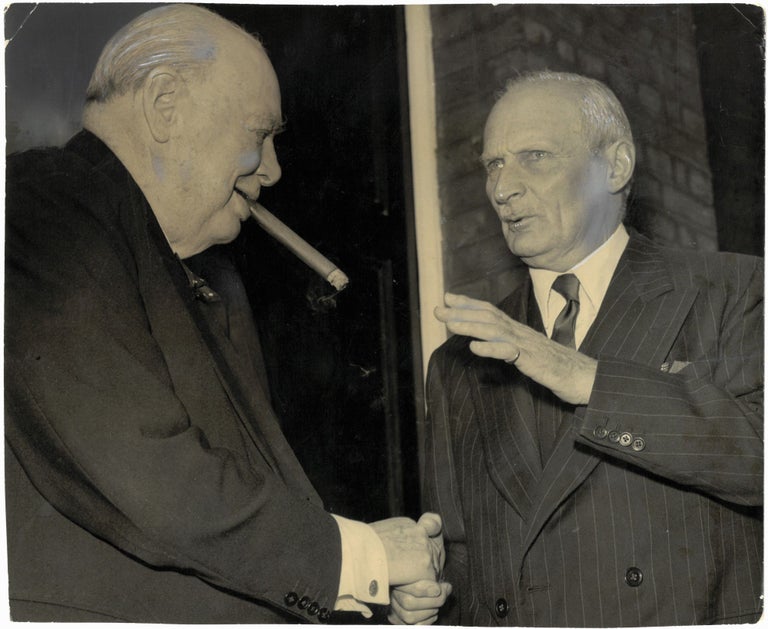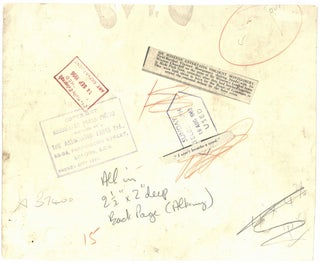I WON'T BREATHE A WORD - An original press photograph of Sir Winston S. Churchill with Field Marshal Viscount Bernard Montgomery taken on the steps of Churchill's Hyde Park Gate home during the Suez crisis in September, 1956
London: Copyright, The Associated Press Ltd., Published by The Daily Telegraph, 14 September 1956. Photograph. This photo shows Sir Winston S. Churchill, a curl of smoke emanating from the tip of his characteristic cigar, shaking hands with a keen-eyed and gesticulating Field Marshal Viscount Montgomery in September 1956. The gelatin silver print is on heavy glossy photo paper and measures 9 x 10.85 in (22.86 x 27.56 cm). The image is crisp. Condition is very good minus with a small creases to the upper right and lower left corners and minor edge wear. There are indications of light touch up work by the Sunday Telegraph Art Department to the heads of both Churchill and Montgomery. Some light scuffs and scratches are visible under raking light.
There are two publication dates for this photograph marked by separate ink stamps on the verso, the first for The Daily Telegraph dated “14 Sep 1956” and the second for the Sunday Telegraph dated “19 Aug 1962”. The verso also features two newspaper clippings with printed captions from when the image was published. One reads simply, and intriguingly cryptically, “I won’t breathe a word.” The other newspaper clipping caption is titled “SIR WINSTON ENTERTAINS VISCOUNT MONTGOMERY” and reads in full “Field-Marshal Viscount Montgomery shaking hands with Sir Winston Churchill on the steps of Sir Winston’s London home in Hyde Park Gate, yesterday, after they had lunched together. They were both about to leave for the House of Commons to attend the resumed debate on the Suez crisis.” The verso also features the copyright ink stamp of “THE ASSOCIATED PRESS, Ltd.” as well as various pencil notation.
In September 1956, Britain and Churchill’s successor to the premiership, Anthony Eden, faced the Suez Crisis, which both further diminished Britain and truncated Eden’s political career. Egyptian leader Gamal Abdel Nasser had nationalized the Suez Canal—a major international shipping lane —prompting mobilization of British, Israeli, and French forces. Eden aborted an assault on the canal under the threat of alienating America. Churchill and President Eisenhower exchanged conciliatory correspondence thereafter, but the crisis was a blow to Anglo-American relations and a brutal deflation of British independence and initiative. The Suez Crisis marked the last major world political crisis in which Churchill would so actively engage.
Field Marshal Bernard Law Montgomery, 1st Viscount Montgomery of Alamein, KG, GCB, DSO, PC (1887-1976) earned his fame in North Africa during the Second World War. In August 1942, then-Prime Minister Churchill gave Montgomery command of the Eighth Army, where Montgomery famously beat Rommel and oversaw defeat of Axis forces in North Africa. He went on to command the Eighth Army in Sicily and Italy, and Allied ground forces during Operation Overlord. After the war he would rise to Chief of the Imperial General Staff and be elevated to Viscount Montgomery of Alamein.
Montgomery and Churchill remained friends, but Montgomery’s later years proved less elevated than those of Churchill. Montgomery’s uncharitable accusations in his postwar memoirs lost him the friendship of Eisenhower and forced Montgomery to publicly apologize to a fellow Field Marshal. Montgomery earned further criticism for declaring support for Apartheid and praising communist Chinese leadership.
This press photo once belonged to a newspaper’s working archive. During the first half of the twentieth century, photojournalism grew as a practice, fundamentally changing the way the public interacted with current events. Newspapers assembled expansive archives, including physical copies of all photographs published or deemed useful for potential future use, their versos typically marked with ink stamps and notes providing provenance and captions. Photo departments would often take brush, paint, pencil, and marker to the surface of photographs themselves to edit them before publication. Today these photographs exist as repositories of historical memory, technological artifacts, and often striking pieces of vernacular art. Item #005336
Price: $125.00


